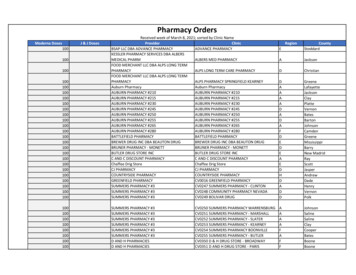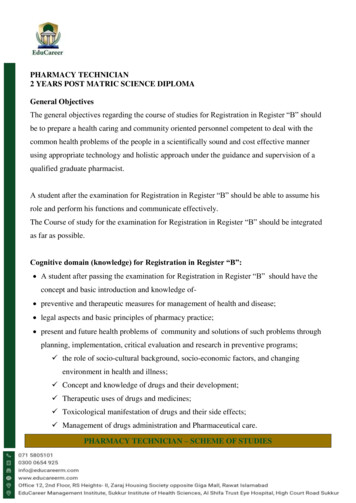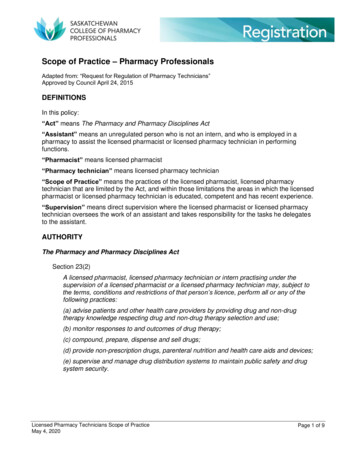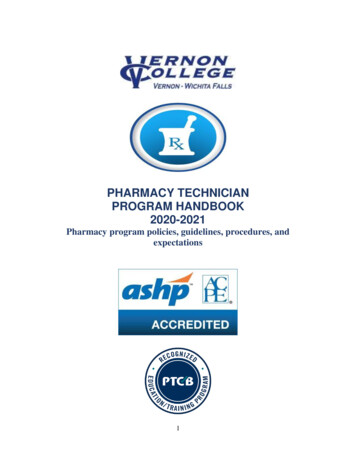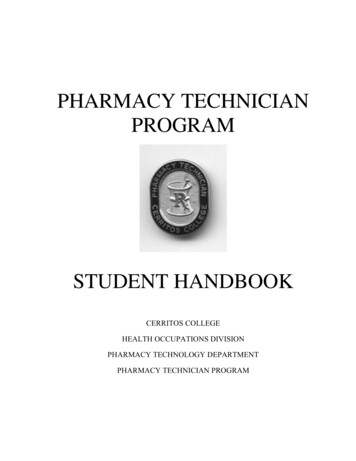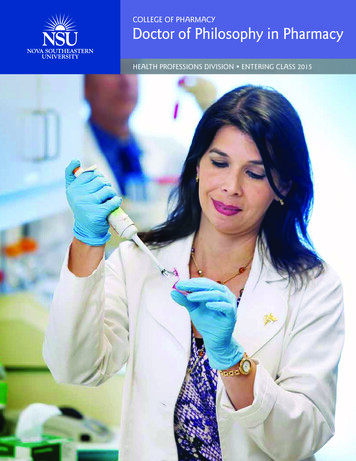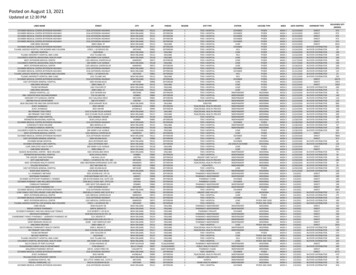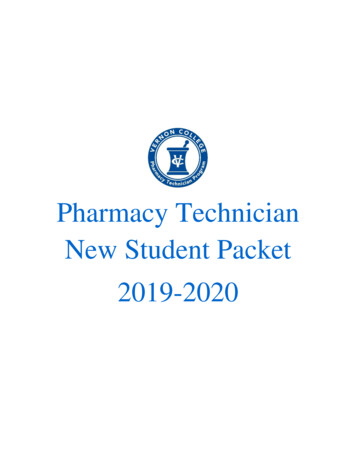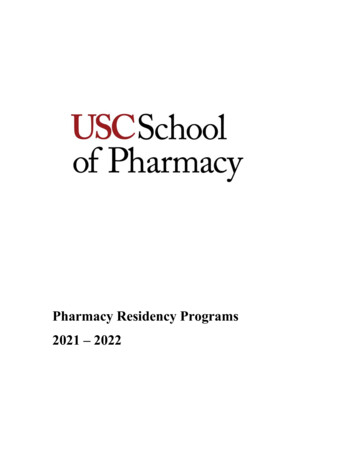
Transcription
1Pharmacy Handbook2020-2021August 2020
2TABLE OF CONTENTSIntroduction . 3General FAQAcademic Advisors . 4Credits . 4- - Credit Limit, Transfer, Challenge, College Entrance Examination Board (CLEP)Degrees (Curriculum Requirement) . 5General Education Requirements. 5Grades and Academic Status . 5- - G.P.A., Retakes, Current CompetencyMajor/Minor. 6Entry-Level Degrees . 6Minors of Study. 7Registration . 7Withdraw to Zero Credits . 7Other Questions . 7Where to Go for Help . 8CHP Policies & Regulations . 10Student Career Commitment Statement . 10Student Academic and Conduct Standards Policy 3.01 . 10Right to Terminate Enrollment Policy 3.03 . 15Status Documentation Policy 3.06 . 15Health Insurance Policy 3.07 . 16Criminal Background Check Policy 3.08 . 16Professional Dress Policy 3.09 . 16Student Technical Standards Policy 3.10 . 16Substance Misuse Testing Policy 3.14 . 18School of Pharmacy Policies . 19Pre-Pharmacy and Professional Pharmacy Majors . 19Workload Statement . 19Repetition of Pre-Pharmacy Core Courses Policy 2.21.1 . 20Current Competency in Coursework Policy 2.28 . 20Academic Remediation and Repetition of Professional Pharmacy Courses 3.20 . 20Minimum Grade Requirement for Pharmacy Coursework Policy 3.21 . 21Prerequisites for Professional Courses Policy 3.23 . 21Professional Electives Policy 3.26 . 21Student Complaint Policy 3.28. 23Student Technical Standards Policy 3.29 . 25Examination Administration Policy 3.30 . 26Certifications . 29Health Vaccines (Exposure to Biohazard) . 29Professional Liability Insurance . 30Scholarships and Awards . 30Technology Requirements for Pharmacy Students . 31Tuition . 32Pre-Pharmacy StudentsPre-Pharmacy Curriculum (EAP & three year track). 33Admissions Policy. 35Professional StudentsPharmD. Educational Outcomes . 38Pharm.D. Course Descriptions and Prerequisites . 52Pharm.D. Curriculum . 56Experiential Program (IPPE & APPE) . 57Post Graduate Residency FAQs. 59Pharm.D./MBA Option . 61Master of Public Health Program . 63Pharm.D./MPH Option . 63Pharm.D./Ph.D. Option . 69Pharmacy Student Activities & Organizations . 72
3August 2020INTRODUCTIONWelcome to the College of Health Professions. We are excited that you are a student in our professionalprogram and I want to provide for you some information that I hope will be of assistance to you duringyour academic journey with us.A very important person during your time with us is your advisor. This individual is available to assist youin planning your program of studies and answer questions about future career options. I urge you to meetregularly with your advisor especially if you have any questions, concerns or need help with anyacademic, College, or campus issues. Faculty and staff are prepared to work with you on an individualbasis and help guide you through your journey with us. Additional career information can also be found inour Administrative Offices in Fargo - Sudro 123 and by attending our Annual Career Fair in September.The professional curriculum is designed to challenge you and to teach you to become an independentlearner and to work in collaborative interprofessional healthcare teams. Therefore, students are expectedto take a very active role in their education and take responsibility for their own learning. Student activelearning is a major emphasis of our program. You will be asked to apply your knowledge, dig for theanswers to questions, communicate both verbally and in writing, critically think and problem-solve throughcase discussions, practice team-based care with students from other disciplines, and participate innumerous experiential activities. I encourage you to ask questions in class and to learn by understandingand applying the material presented rather than by simply memorizing factual information. The goal of ourcurriculum is for you to achieve the necessary life-long learning skills which will become important to youin your future career as a health professional to be able to “keep up” with the plethora of new informationassociated with our rapidly changing health care system. Your ultimate success will be determined by theamount of effort you are willing to put into your academic studies. So work hard and give your best effortin all that you do. If you give us your best, you will receive the best in your educational experience withus. It will also be important that you learn more than just the technical skills of practicing in your disciplinebut that you also learn what it means to become a health professional and practice professionalism inevery and all situations. You will need to learn how to practice ethically, responsibly, with honesty,integrity, and good moral character and treating others (especially your patients) with compassion, caring,understanding, and respect which is expected of any health professional. These will be the keys to yourfuture success as a health professional.We desire to provide a positive learning environment for all students here within the College and we striveto continually improve our program. Students are a very important part of this process and we activelysolicit your input and active participation through various formats. Students are elected from each class toserve on the Dean’s Student Liaison Committee. This committee meets with the Senior Associate Deanthroughout the year to bring student concerns to the attention of the administration. In addition, theCollege holds a Deans’ Open Forum each semester to allow students an opportunity to interact directlywith the Dean (and his administrative leadership team) on matters of interest and concern to students.And I also want you to know that my door is always open to you, so please don’t hesitate to stop by myoffice if you need my assistance for anything. We encourage you to use these sources as well as visitswith faculty, or any of the members of the staff in our Administrative Offices whenever you have issuesthat need to be brought to our attention. In addition, I encourage you to become actively involved withyour profession by joining one of our student professional organizations. This is a great way to learnabout what’s going on within your profession and begin contributing to the advancement of your futureprofessional career and practice.This “Handbook” is devoted to academic information to help enhance student success within ourprogram. We hope you find it helpful to you. I wish you much success in your educational pursuits with usand in your later professional practice.Best wishes to you for a successful year!Charles D. Peterson, Pharm.D.Dean, NDSU College of Health Professions
4GENERAL FAQAN INFORMAL GUIDE: The following is a series of informal responses to questions most frequently askedabout rules and procedures at NDSU. For further information, please refer to the current NDSU Bulletin(www.ndsu.edu/bulletin/), your adviser, Administrative Office in Sudro 123, the Office of Registration &Records in Ceres 110, or One Stop in the Memorial Union.ACADEMIC ADVISORSWho is my advisor? Pre-pharmacy students should reach out to pre-pharmacy advisor Kelly HaugenFriesner. Students in the professional pharmacy program are assigned an adviser. It is important to meetwith your advisor on a regular basis to receive updated curricular information. Advisors help studentslearn how to complete the registration procedures. Students are responsible for the course andprogram selections which they make. However, an advisor is a valuable source for acquiringinformation about the advisability of student choices. (If you desire a change of advisor, pleasecontact the Senior Associate Dean, School of Pharmacy, 231-7601.)Do I need to see my advisor about my semester schedule? Yes, make an appointment with youradviser during advising week to plan your schedule of classes. Dates for advising and registration areavailable on the Office of Registration & Records web site (www.ndsu.edu/registrar) and “TheSpectrum,” published twice per week when full semester classes are in session.CREDITSHow many credits do I need to be a Sophomore, a Junior and a Senior? You need 27 credits to beclassified as a Sophomore, 60 credits to be classified as a Junior, and 90 credits to be classified as aSenior. To graduate, you must successfully complete all general education requirements, therequirements in your major, and with a minimum of 2.0 grade point average. A complete list of Universityrequirements for graduation is in the current NDSU Bulletin.What is the limit on the number of credits I can take per semester? Full-time students will carry from15 to 19 credits per Semester. Registration for more than 20 credits is not recommended. Specialpermission from your adviser and a grade point average of at least 3.0 are required to register for morethan 20 credits. You must obtain a “Petition to Enroll in More Than 20 Credits” form under the link, “Over20 Credits Petition,” at www.ndsu.edu/registrar/forms.How many credits will I lose when I transfer to NDSU from another school? Ordinarily you shouldn'tlose any. However, a "D" grade in any course does not transfer to the College of Health Professions.Some technical courses may not fit your degree program and in this case some extra work may berequired. For evaluation of transfer credit see current NDSU Bulletin.How many credits can I transfer from a junior or community college? All college-level credits fromregionally accredited institutions transfer; however, not all may apply to the particular degree program youhave selected. To obtain a baccalaureate degree you must complete at least 60 semester credits at afour-year college or university. At least the last 37 of these credits must be at the junior or senior level.(See current Bulletin.)How do I challenge a course? A student who is currently registered may seek credit by challenging acourse. A course challenge usually consists of a special comprehensive examination; however,additional types of performance may be required for some courses. A course challenge is only permittedfor courses in which the student has not received transfer credit or has no previous academic record.Prior registrations are allowable if course was dropped prior to the No Record Drop deadline in a giventerm. Student must be registered at NDSU during the semester in which you wish to challenge a course(see current NDSU Bulletin for complete descriptions). Procedures for pursuing a course challenge maybe found at: df
5Is it possible to obtain college credits by taking examinations of the College EntranceExamination Board (CLEP and AP)? Yes. Students may demonstrate evidence of college-levelachievement through the use of nationally standardized tests. Competency to write these examinationsmay have been gained through intensive preparation in high school, extensive reading in a particularfield, or other types of formal or informal preparation. A student may not repeat by proficiency testing acourse that has been previously taken or failed at NDSU or another accredited institution. Score reportsmust be sent directly to NDSU from the awarding agency/board. School reports and student-issued gradereports are not considered official for purposes of awarding credit by examination.DEGREES (CURRICULUM REQUIREMENT)How do I petition for a waiver or substitution of a curriculum requirement? To petition, you mustobtain a “Request to Waive or Substitute Courses” form under the link, “Substitute/Waive a Course” atwww.ndsu.edu/registrar/forms. In this petition, which is presented to the Academic Affairs Committee ofthe College of Health Professions, you state exactly why you think you should have a waiver. TheCommittee will review your petition and you will be notified of their decision. (Petitions should besubmitted only when special circumstances make it virtually impossible for you to meet the regular degreerequirements.) Only departmental and college requirements may be waived. Universityrequirements may not be waived.GENERAL EDUCATION REQUIREMENTSWho must complete the General Education Requirements? The General Education Requirementsapply to all students.What are the General Education Requirements? The General Education Requirements are listed inthe current NDSU Bulletin. A list of the courses approved for the different categories is provided atwww.ndsu.edu/registrar/academics/gened.General Education transfer with the ND University System. Students who plan to transfer from oneinstitution to another in the ND University System should check with Office of Registration & Records inCeres 110 or One Stop in the Memorial Union.GRADES AND ACADEMIC STATUSWhat is the G.P.A.? Grade Point Average. For each credit of “A” you receive four (4) honor points;three (3) for each credit of “B”; two (2) for each credit of “C”; one (1) for each credit of “D”; and zero (0) foreach credit taken in which a grade of “F” is received. The GPA is computed by dividing the total numberof honor points earned at NDSU by the total number of credit hours in which honor points were recorded.For example, a person with a G.P.A. of 3.00 has a grade average of “B.” The minimum GPA of 2.00 isrequired for graduation. Developmental courses do not count toward graduation requirements.If I do not do well in a course, may I take it over again? Yes. The second grade, whether higher orlower, will replace the first grade in computing the GPA. Both grades are listed on your PermanentRecord. To replace a grade for a course taken at NDSU, that course MUST be repeated at NDSU.The one exception is that NDSU students may register for a Tri-College course to repeat a coursepreviously taken at NDSU.NOTE: PROFESSIONAL COURSES IN THE PHARMACY PROGRAM - please refer to Policy #3.24,Repetition of Professional Courses, in the College Policy Manual.NOTE: PRE-PHARMACY CORE COURSES, Policy #2.21.1 - The total number of pre-pharmacy corecourses which may be repeated shall be limited to three. The grade received during the student’s finalattempt for any core pre-pharmacy course will be used in evaluation for admission. A withdrawal is notconsidered an attempt. A core course is one that is included in the GPA for admission purposes.CURRENT COMPETENCY, Policy #2.28 - Coursework in the areas of science and mathematics must beno more than seven years old at the time of application to the professional program. Courseworkpresented in these areas that is older than seven years must have current competency demonstrated.Current competency may be demonstrated by a) retaking a portion of the series in question, i.e. 122 of
6121/122 Chem series; b) enrolling in a formal audit that is indicated on a student’s official transcript; c)challenging coursework through the department in question; or d) meeting with faculty in the areas ofScience or Mathematics and having them determine current competency. Students who intend to meetcurrent competency requirements using item c or d must receive approval from the Chair of PharmacyAdmissions Committee prior to undertaking the current competency. (This coursework does not fall underthe rule, “Repetition of Pre-Pharmacy Core Courses.)Will I receive mid-term grades? Upon request, all instructors shall inform students directly of theirapproximate mid-term grades before the end of the eighth week of the semester.MAJOR/MINORHow do I change my major? Occasionally students find they are not suited for a particular field. If youdecide to change majors while you are a student in the College, you are expected to follow thisprocedure: discuss it with your adviser, fill out the electronic form “Major/Minor and Adviser ChangeForm,” www.ndsu.edu/registrar/forms. You will be assigned a new adviser in the field in which you willbe majoring. Once you select a major, you must transfer to the college that offers the major.How many credits are required for a Minor? The number of credits required for a minor varies bydepartments. The minimum number of credits for a minor is 16. To determine the exact number ofcredits that you will need for a minor, check with your adviser, or in Ceres 110 or One Stop.ENTRY-LEVEL DEGREESAn entry-level degree is a degree program that a student who has graduated from a U.S. K-12 system andis newly admitted to NDSU can purse directly out of high school. Entry-level degrees include all bachelordegrees and a selected number of (but not every) professional and/or graduate degrees. The College ofHealth Professions offers the following entry-level degrees:Entry-level degrees offered through the College of Health Professions:Bachelor of Science in Health ServicesEntry-level degrees offered through the Department of Allied Sciences:Bachelor of Science in Medical Laboratory ScienceBachelor of Science in Radiologic Sciences- Includes sub-plans in:SonographyX-ray TechnologyBachelor of Science in Respiratory CareEntry-level degrees offered through the School of Nursing:Bachelor of Science in Nursing- Includes the following programs:pre-professional BSN programLPN to BSN programRN to BSN programEntry-level degrees offered through the School of Pharmacy:Doctor of Pharmacy (Pharm.D.)- Includes the following dual-degree programs:Pharm.D/MBA: In conjunction with NDSU College of Business.Pharm.D./MPH: In conjunction with the Department of Public HealthPharm.D./Ph.D.: In conjunction with the Department of Pharmaceutical SciencesNOTE: For all dual degree programs students must first be admitted to the Pharm.D. program andfulfill all graduate school requirements prior to beginning coursework for the second degree.
7MINORS OF STUDYWhat do you recommend? The following is a partial list of minors that may be of interest to pre-pharmacyand pharmacy students. Go to the following web page, https://www.ndsu.edu/majors/, and select theprogram of study from the list. AccountingBiotechnologyBusiness AdministrationChemistry: The Chemistry Minor is given automatically with the BS in Pharmaceutical Sciencesdegree.GerontologyHealth CommunicationMicrobiology: (Students interested in a microbiology minor must take Micr 350 and 350L, insteadof Micr 202 and 202L.)Psychology – Neuroscience MinorPsychologySpanishWellnessCurriculum Guides for all Majors and Minors: /REGISTRATIONHow do I register for courses? Students will use the “Campus Connection Student Portal” via theNDSU Home Page in which to register for classes. Students will also use this portal for the following:account information, class list for the semester, course catalog of classes, drop/adds, financial aidinformation, holds, schedule of classes for the semester, unofficial transcripts, and much more(www.ndsu.edu/onestop/connect).WITHDRAWING TO ZERO CREDITSHow do I withdraw to zero credits? If you find it necessary to withdraw to zero credits during anysemester in which you are enrolled, you must file a completed "Cancellation of Registration/Withdrawingto Zero Credits" form at www.ndsu.edu/registrar/forms and select the link “Withdraw to Zero Credits(cancellation or registration). Process your withdrawal at One Stop in the Memorial Union, during regularbusiness hours, Monday through Friday. Refer to the University’s official dates and deadlines,www.ndsu.edu/onestop/, for the last day to withdraw. Withdrawals after this date are not processedwithout evidence of compelling circumstances beyond the student’s control. If you do not want to attendthe next semester but are finishing the semester you are presently enrolled in, simply do not register forthe next semester.OTHER QUESTIONSWhat if I think a course is of poor quality or an instructor is unfair? Talk with the instructor first. Ifthe situation is not resolved, notify the department chair or the Interim Associate Dean of the School ofPharmacy. Such information is important if improvement is to be brought about now or in the future.Remember that even if changes cannot be made immediately, your comments are taken seriously.What if I think a course or instructor is exceptionally good? Tell the instructor and notify thedepartment chair and the Interim Associate Dean of the School of Pharmacy.What if I think I have been treated unfairly? Bring your situation to the attention of your advisor, theDepartment Chair, the Dean of your college, the Senior Associate Dean in the College of HealthProfessions, or the Interim Associate Dean of the School of Pharmacy. You may be advised to prepare apetition for relief from a bad situation or unfair decision.
8Can I see the Deans? The Dean of the College of Health Professions is Dr. Charles Peterson. He iseager to meet students and is deeply concerned about the kind of education they receive, as well asproblems facing students at NDSU. To set up an appointment with him, contact his assistant at 2315383. The Dean's Office is in the Administrative Office, Sudro Hall 123.Dr. Daniel Friesner, Senior Associate Dean, handles student affairs (among other responsibilities) withinthe College of Health Professions. He is concerned about students and can assist with personal, careerand admissions issues. He may be reached at 231-7601, Sudro Hall 123.Dr. Michael Kelsch, Interim Associate Dean, oversees curriculum and assessment activities within theSchool of Pharmacy. He is concerned about students and can assist with academic and career issues.He may be reached at 231-6528, Sudro Hall 123.Department Chairs in the Pharmacy Program are: Pharmaceutical Sciences – Dr. Jagdish Singh, 2317661, Sudro Hall room 136; Pharmacy Practice - Dr. Amy Werremeyer, 231-7603, Sudro Hall 118H.WHERE TO GO FOR HELPTOPIC/PROCEDURE:Academic DeficienciesAcademic PoliciesAdd or drop a courseAdvanced PlacementAppeal for exception to academicregulationsAppeal a gradeApply for loanApply for scholarshipCareer/Job Search(Placement Program)Change Majors within NDSUCheck content of coursesCheck on a gradeCredit by examination (Challenging acourse, PEP orCLEP tests)Disability ServicesDiscuss academic problemsDiscuss personal problemsSOURCE/CONTACT:LOCATION: Advisor Interim Associate Dean for Academic Affiars Dr. Kelsch Office of Registration & Recordswww.ndsu.edu/registrar/ Current NDSU Bulletin www.ndsu.edu/bulletin/Current NDSU Bulletin www.ndsu.edu/bulletin/ Advisor Office of Registration & Recordswww.ndsu.edu/registrar/ The individual departments Registration & Recordswww.ndsu.edu/registrar/ Current NDSU Bulletin www.ndsu.edu/bulletin/Office of Registration & Recordswww.ndsu.edu/registrar/Student Rights & Responsibilities refers to theGrade Appeals Board at:www.ndsu.edu/fileadmin/policy/337.pdf NDSU Financial Aid and Scholarshipswww.ndsu.edu/onestop/finaid/loans/ One Stopwww.ndsu.edu/onestop/finaid/loans/Office of AdmissionSudro 123231-6528Ceres 110231-7981Ceres 110231-7981Ceres 110231-7981Ceres 110231-7981Memorial Union 250,main level231-6560Memorial Union 176231-6200Ceres 114231-8643Ceres 306 Career Center, www.ndsu.edu/career/ Current NDSU Bulletin www.ndsu.edu/bulletin/ 231-7111eForm through the Office of Registration &Records web site, www.ndsu.edu/registrar/forms- select “Major/ Minor and Adviser Change form”Current NDSU Bulletin & Departmentswww.ndsu.edu/bulletin/ Campus Connection Student Portalwww.ndsu.edu/onestop/connect/ Instructor of course Office of Registration & RecordsCeres 110www.ndsu.edu/registrar/231-7981 Current NDSU Bulletin www.ndsu.edu/bulletin/NDSU Disability ServicesMain Library, Suite 17www.ndsu.edu/disabilityservices/231-8463Interim Associate Dean - Dr. KelschSudro 123231-6528Sudro 123 Senior Associate Dean - Dr. Friesner231-7601 Counseling CenterCeres 212www.ndsu.edu/counseling/personal counseling/231-7671
9TOPIC/PROCEDURE:Financial Aid InformationFood ServiceGeneral Education RequirementsGrades & Honor PointsGraduation RequirementsHealth ServiceHousingMajor RequirementsOne StopPass/FailPre-Professional ProgramsRegistrationRemove an IncompleteResidence ClassificationResident Assistants & Peer MentorsROTC Program - Air ForceROTC Program - ArmyStudent OrganizationsStudy Abroad ProgramsStudy SkillsSummer StudySOURCE/CONTACT: NDSU Financial Aid and Scholarshipswww.ndsu.edu/onestop/finaid/ One Stopwww.ndsu.edu/onestop/finaid/ Current NDSU Bulletin www.ndsu.edu/bulletin/NDSU Dining (Residence Dining Center, UnionDining Center, West Dining Center) Registration Schedule Current NDSU Bulletin www.ndsu.edu/bulletin/ Advisor Office of Registration & Recordswww.ndsu.edu/registrar/ Current NDSU Bulletin www.ndsu.edu/bulletin/ Office of Registration & Recordswww.ndsu.edu/registrar/ Current NDSU Bulletin www.ndsu.edu/bulletin/ NDSU Wellness Centerwww.ndsu.edu/wellness/ Current NDSU Bulletin www.ndsu.edu/bulletin/LOCATION:Memorial Union 176231-6200Bison Court West231-7001Ceres 110231-7981Ceres 110231-7981Ceres 110231-7981Wallman WellnessCenter, 231-5200Student HealthService, 231-7331Bison Court West231-7557 University Residence Life Officewww.ndsu.edu/reslife/ Current NDSU Bulletin www.ndsu.edu/bulletin/ Advisor This Handbook-see Pharmacy Curriculum Pharmacy Administrative OfficesSudro 123 Current NDSU Bulletin www.ndsu.edu/bulletin/ 231-7601One-stop student service center (assistanceMemorial Union 176,from Customer Account Services, Registration & main level,Records and Financial Aid and Scholarships)231-6200www.ndsu.edu/onestop/ Advisor Current NDSU Bulletin www.ndsu.edu/bulletin/Ceres 110 Office of Registration & Records231-7981www.ndsu.edu/registrar/ Office of Registration & RecordsCeres 110www.ndsu.edu/registrar/231-7981 Current NDSU Bulletin www.ndsu.edu/bulletin/ Office of Registration & RecordsCeres 110www.ndsu.edu/registrar/231-7981 Campus Connection Student Portalwww.ndsu.edu/onestop/connect/Instructor of course Office of Registration & RecordsCeres 110www.ndsu.edu/registrar/231-7981 Current NDSU Bulletin www.ndsu.edu/bulletin/Ask at your Residence Hall Office if you don’tknow your RA or Peer Mentorwww.ndsu.edu/reslife/ Bentson-Bunker FieldHouseRoom 101www.ndsu.edu/afrotc/231-8186 Be
course that has been previously taken or failed at NDSU or another accredited institution. Score reports must be sent directly to NDSU from the awarding agency/board. School reports and student-issued grade reports are not considered official for purposes of awarding credit by examination. DEGREES (CURRICULUM REQUIREMENT)
